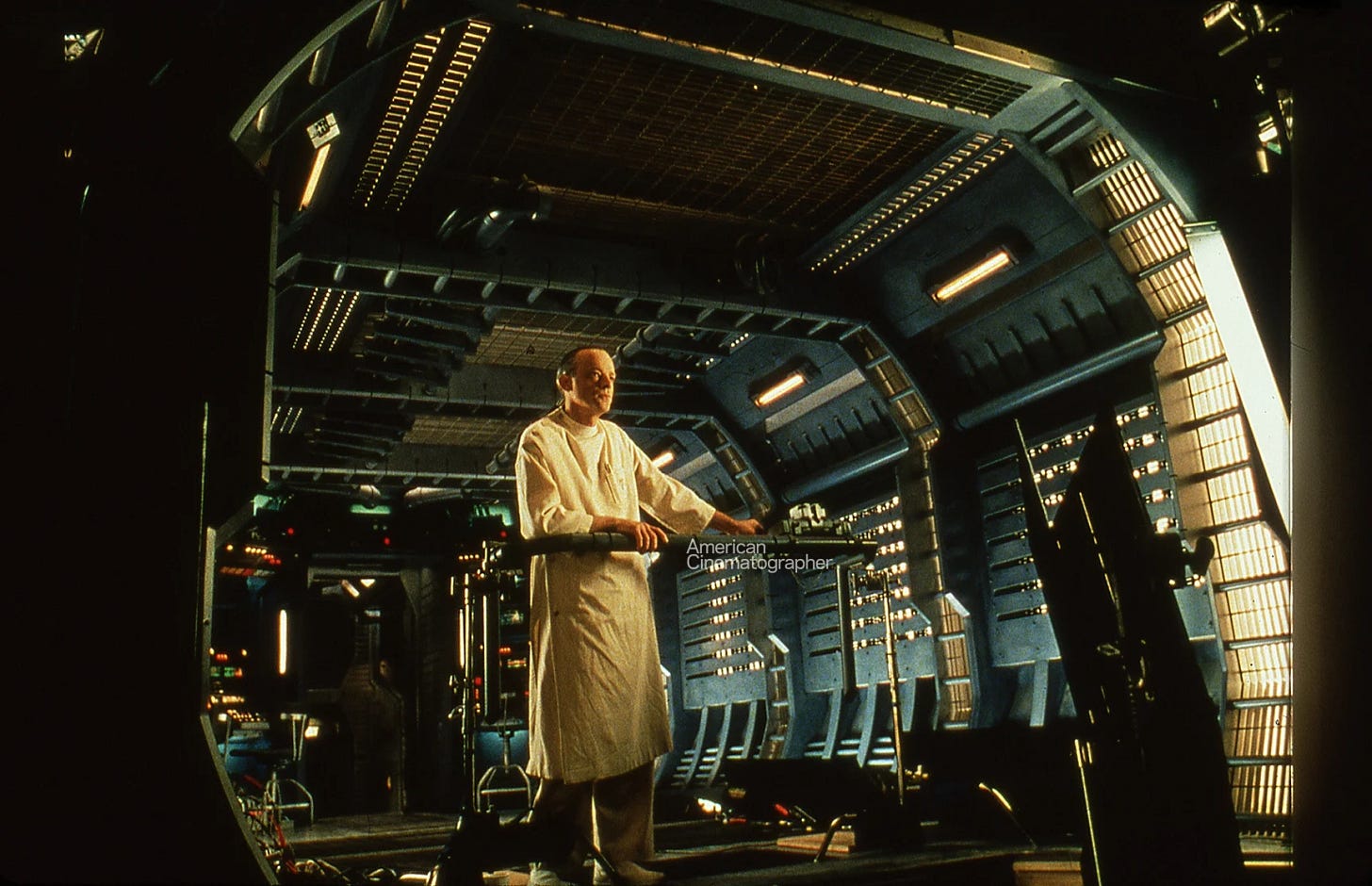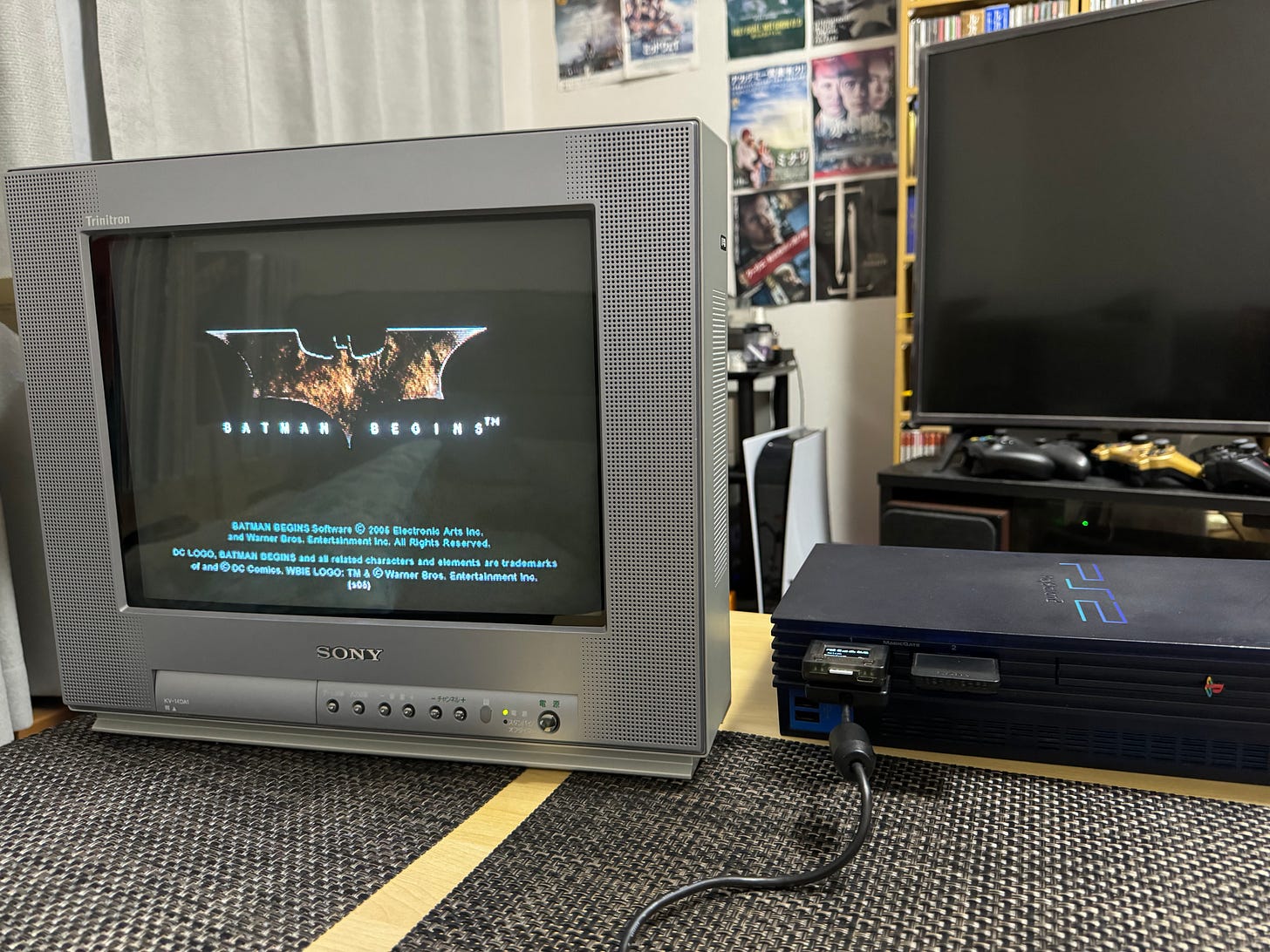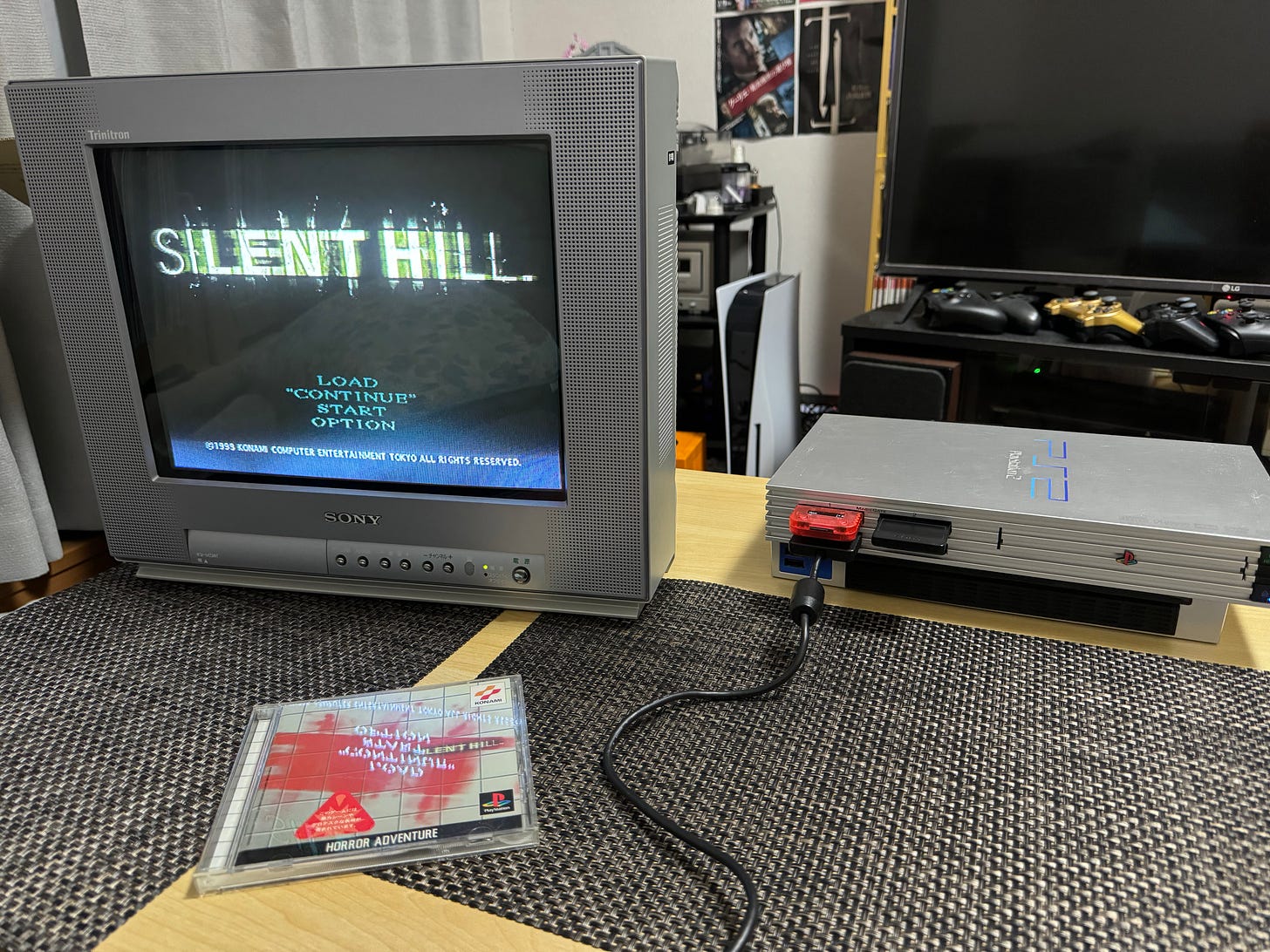Bonus Perspectives: Trump's Lex Fridman Interview, J-vloggers, Alien, Predator, and How I Rescued a PlayStation 2
Analyzing a recent Trump podcast appearance, the changing landscape of YouTube channels covering Japan, and your weekly media recommendations.
Bonus Perspectives is a weekly column series containing my thoughts on the latest Western news and Japanese news, as well as film, television, music, book, and video game recommendations. It’s free for all subscribers to this Substack, but if you enjoy my writing, consider opting for a paid subscription. Doing so will give you access to exclusive in-depth pieces and my entire backlog of work. Your support is greatly appreciated!
Paid subscriptions are currently 20% off from now until the end of October.
Donald Trump went on Lex Fridman’s podcast — and said a whole lot of nothing
Note: This was written before Donald Trump and Kamala Harris’ first debate on September 10. I haven’t watched it yet and will cover it in next week’s column.
As the 2024 U.S. presidential election draws closer, candidates Donald Trump and Kamala Harris are campaigning hard to get as much last-minute support as possible. I would wager that the vast majority of Americans decided who they were voting for a long time ago, but there is always an undecided middle who could vote for either side or not at all. Not campaigning in key areas with the expectation that victory is guaranteed can kill campaigns, as seen with what happened with Hillary Clinton in 2016. This is going to be a very close race regardless of outcome.
What separates 2024 from previous elections, however, is the advent of podcasting. The medium for conversation is nothing new, but the rise of programs like The Joe Rogan Experience is playing a significant factor in how online political discourse is being shaped. Robert F. Kennedy Jr. was possibly the first presidential candidate to appear on a podcast, but as I explained in last week’s column, his chances of winning were always nil. Donald Trump on the other hand? Now that’s a different story.

Whether you love or hate Trump, few would doubt that he understands how to spread his message to the widest audience possible. Despite being 78 years old, he has long mastered the Twitter game and reaches millions of people via his Truth Social social media platform. In a first for a major political candidate, he is now doing the podcast circuit as part of his campaign. Trump’s appearance on Theo Von’s program already has over 13 million views as of this writing, while he has even been on less famous podcasts in recent months.
None of these really captured my attention, however, until he went on Lex Fridman’s show last week. At this point, Fridman’s podcast is probably one step below Joe Rogan’s with overall reach and popularity, so this was quite the big deal. In their roughly 45-minute conversation (the rest of the video is just Fridman doing a solo Q&A session), the former U.S. president discussed everything from Ukraine to Jeffrey Epstein. This was an opportunity for one of the biggest podcasters in the world to ask Trump tough questions and press him on controversial issues, but what we instead got was a lot of fluff and very little real substance.
I have to be transparent and say that my admiration for Lex Fridman has declined considerably in the last couple of years. I initially believed him to be one of the best podcasters out there, and in some ways still do because of the variety of guests he’s able to invite on his show, but his inability to ever push back is not the mark of a good interviewer. It has become somewhat of a meme that Fridman’s MIT background and rather monotone delivery gives him the personality of an android, but that’s less important to me compared to his program potentially delivering false information unchallenged to millions of viewers.
I began to get off the Lex Fridman train after it became apparent that his naive “peace and love” attitude was utterly useless against Kanye West when the disgraced rapper appeared on his show in late 2022. Fridman (who himself is Jewish) was completely ineffective in combating West’s blatant antisemitic rants and perpetuation of conspiracy theories, making the whole conversation a waste of time. He has also been very disappointing on the war in Ukraine, preferring to platform Russia apologists like John Mearsheimer while taking the bizarre stance common in both paleoconservative and far-left circles that terrorist states like Iran wouldn’t be terrorist states if it wasn’t for the United States.

With that context in mind, it’s unsurprising that Lex Fridman’s interview with Donald Trump was a frustrating experience. To give the former president credit, I do think he’s playing a wise game in appearing on podcasts. As far as I know, Kamala Harris has not done the same, and this is a clear blindspot she should not ignore until the election. Her pre-recorded softball interview with CNN was little more than preaching to the choir and showed how often outdated legacy media is in today’s world of 24/7 online discourse.
Of course, that does not let Trump off the hook either. While a podcast in theory should be an opportunity to break through the high degree of inauthenticity seen in all politicians, his conversation with Fridman was little better than Harris’ with CNN. Trump even mentioned the CNN interview as being “softball,” which is wholly ironic considering that Fridman offered little pushback to his claims of election fraud and Harris being a communist.
I wish I could provide a detailed analysis of what Trump discussed with Fridman, but there’s frankly very little to analyze. When asked about how he would resolve the war in Ukraine, Trump merely deflected and blamed the entire conflict on Biden for happening in the first place. To be fair to Fridman, he did attempt to ask a few follow-up questions throughout the interview, but more often than not was met with bizarre rambling akin to that of an old man in a retirement home.
With the actual content of their conversation being largely superfluous, two major things stood out to me. The first is that 2024 candidate Donald Trump is far away from 2016 candidate Donald Trump in terms of overall energy and charisma. It was rightfully pointed out that Joe Biden was not competent enough to run for another term, but if Trump wins, we now have to worry about another elderly president who could be in the early stages of cognitive decline. Trump is currently 78 years old and by the end of his second term would be older than Biden is now. While Trump is still sharp enough in interviews, age eventually catches up to everyone and he’s hardly a spring chicken.
Second, I noticed that Trump seems to operate on two modes. When asked about deeper philosophical concepts like leadership and death, I could actually detect a few traces of introspection compared to his normally callous demeanor. I’m sure that nearly being killed has caused the former president to think far more deeply about his own mortality, but weakness is something he will obviously never show. His other mode of thought is being constantly on the offensive, which is why he never ceased to bash Biden and Harris instead of providing substantive answers to Fridman’s questions.
Those who have spoken to Trump personally claim he’s actually a fairly decent listener and has the talent for making you feel like you’re getting his full attention. Regardless of whatever the man is in private though, what the American people will get should he be elected again is who he is in public as president of the United States. This podcast won’t tell anyone anything about Trump they don’t know already.
The decline of J-vlogging and the changing landscape of YouTube channels covering Japan

Last week I was caught in some minor controversy on Twitter after I wrote a lengthy post essentially explaining why I no longer find the YouTube channel Abroad in Japan particularly relatable or compelling when it comes to covering life in this country. I stated that while I’m happy for Chris Broad’s success and that he makes decent travelogue content, his status as a wealthy YouTuber who hangs out with other YouTubers makes it difficult for me to consider him someone who represents the average person living in Japan.
The main inspiration for my thoughts was Chris’ video “Has Japan Gotten Worse in the Last 10 Years?” which didn’t necessarily have any points I particularly disagreed with, but it was pretty clear that Chris’ life as a well-off content creator greatly contrasted with the perspective provided by his working class friend Natsuki who is facing more difficulties with getting by. I wrote that whether or not Japan’s economy gets worse from here, Chris is very likely to be fine as someone with multiple income streams, businesses, and merchandise. Videos posted by his wife Sharla show that the couple certainly has the money to spend on lavish housing renovations, so they’re doing far better than the average Japanese person who only pays ¥50,000 to ¥70,000 ($350 USD to $490 USD) a month on rent.

Chris did end up responding to my Twitter post and we had a polite public exchange, though ultimately the entire conversation was deleted by both of us to avoid further drama as the comments from other users surrounding it were hardly constructive. He pointed out that despite being successful, he had not forgotten his more humble roots and that while it may seem that he associates largely with other YouTubers, he has a close-knit group of Japanese friends who regularly tell them their perspectives. I decided to take him at his word and there is no ill will between us, but ultimately I think where Chris is now symbolizes how much the landscape of Japan YouTube content has changed. And not entirely for the better either.
I began watching Abroad in Japan back around 2012 when Chris Broad was an assistant English language teacher working in Sendai. He did not have the ritzy Tokyo studio he currently shoots from or dozens of lucrative sponsors. He was simply a man with a camera in a small apartment giving updates on his life in the Japanese countryside. His dry humor and likable personality were a big reason for his early success, which are traits that have still largely carried over today. YouTube was a vastly different place over a decade ago too and so was the world of J-vlogging, or video blogs about living in Japan.
In the 2000s and for most of the 2010s, Japan was long considered to be a place few foreigners would ever visit. While it’s currently cheaper than ever to come here now, over a decade ago YouTube was how most learned about this country. Channels like Gimmeabreakman, Rachel and Jun, and Sharla in Japan got into the content creation game early, while less notable ones had their 15 minutes of fame before fading into the internet ether as most usually do. Abroad in Japan, however, was easily the most well-produced out of all the J-vlogging channels. Chris Broad learned how to gradually improve his production values, resulting in some genuinely informative and entertaining content.
Yet eventually something had to change. J-vlogging content became stale because there’s only so much one can discuss about daily life in Japan, and it reached a point where if you watched one of these channels, you essentially had watched them all. Very few of these content creators are still around in 2024 and even fewer are making consistently popular material. J-vlogs are essentially dead and social media revolving around Japan has devolved into clickbait fodder appealing to the lowest common denominator on YouTube Shorts and TikTok.

Abroad in Japan outlasted the vast majority of its original contemporaries because it evolved with the realities of changing online content. Chris has over 3 million subscribers as of this writing, wrote a bestselling book, and has been featured in news outlets like the BBC because he kept his content varied and fresh. Yet with video titles like “I Tried Stopping at Every Tokyo Station in a Day” and “I Survived 24 Hours on Japan’s Abandoned Island,” it’s pretty clear to me that Chris is now emulating the Mr. Beast model of YouTube content instead of creating more down-to-earth videos with a realistic perspective on daily life in Japan.
In some sense, I suppose this is inevitable the bigger one gets on YouTube. Chris has even admitted that he dislikes the thumbnail and clickbait title aspects of the site, so I don’t blame him for playing the game the way it’s meant to be played. By simply pointing out that a rich YouTube celebrity may not be representative of the average person who lives in Japan though, I ended up getting inundated with responses like these, which just illustrate the overall problem of parasocial relationships viewers have with YouTubers now.

I’m probably stating the obvious, but the Japan people see through YouTube and social media is very different than the Japan people actually live in. J-vloggers in the old days also had to be creative with constantly producing interesting content, and the pace at which things constantly have to change because of online algorithms has only lead to an even greater increase of low quality or misleading videos purely designed to get clicks. I want to state unequivocally that Chris Broad is nowhere near as bad as the “new generation” of social media influencers (God, I hate that word), but even he has to be aware of what drives views to be a successful content creator.
So ultimately, what do I think of Abroad in Japan? I believe that Chris Broad has genuinely earned his success as one of the most popular Japan-focused YouTubers on the site. His production values are stellar and his charming personality sets him apart from others who come across as fake or unconvincingly enthusiastic. But personally, his videos are no longer for me. His best stuff was from years ago which highlighted subjects like the 3/11 tsunami in Tohoku and more grounded aspects of life in Japan, but that’s rarely the content he makes today. I realized a long time ago that I wasn’t his target audience anymore and that’s perfectly fine.
What I’m watching — All the Alien and Predator films

In preparation for Alien: Romulus, my wife and I decided to sit down and watch every single Alien and Predator film. Yes, all of them. There’s a lot to cover here, so I’ll keep the introduction short and summarize my thoughts on each one.
Alien (1979): A timeless masterpiece that succeeds at being one of the best horror and science fiction films of all time. Ridley Scott’s second best next to Blade Runner. While the later entries in this franchise would have bigger budgets and grander scale, for me the pacing and immaculate analog design of the original Alien can’t beat. Sigourney Weaver being the youngest of the cast next to veteran actors like John Hurt and Ian Holm makes this one feel like a bridge between different eras of cinema. And yet it still holds up immaculately today. I don’t have to say much more, you already know what a classic this is.
Aliens (1986): The default fan favorite of the franchise for many and what most saw first. It’s indeed a worthy sequel to the original Alien, but it takes things in a completely different direction. James Cameron has always been more action and spectacle focused than Ridley Scott’s more cerebral approach to things, but his direction here is splendid. I still like the horror vibe of Alien over the action vibe of Aliens, but that’s just down to personal preference. You can’t go wrong with either.
Spaceballs (1987): Yes, I’d say this counts and shouldn’t be skipped if you’re rewatching all the Alien films. It also serves as a good palette cleanser between the first two Alien movies and the first Predator, which was released in the same year. I won’t spoil the ending for anyone who hasn’t seen it, but rest assured it’s a riot. Mel Brooks is a comedic genius and his films are endlessly rewatchable. Another subject for another column one day I’m sure.
Predator (1987): One of the finest action films of the 1980s and among Arnold Schwarzenegger’s best work. It begins as what seems like will be a standard war flick, but gradually changes into something totally unique that crosses into the realm of science fiction. Some of the effects on the Predator itself haven’t aged well, but the fantastic action more than makes up for it. The dynamic between the soldiers as they battle through the oppressive heat and tension of the jungle is also another highlight. Your mileage may vary if you want to watch these films in tandem with the Alien series, but I think they compliment each other well. At the very least, watch this one.
Predator 2 (1990): Unfairly criticized, but I think its reputation has gotten better over time. Getting rid of Arnold is automatically going to make it a lesser film, but Predator 2 largely works well as a sequel not trying to retread the same ground of its predecessor. The decision to transition the setting into a city (it’s the concrete jungle, get it?) was genius and lends itself into some interesting situations with the new Predator. Danny Glover is no Arnold, but he obviously was never trying to be. If the first Predator is combining the war film genre with sci-fi, then Predator 2 is combining the police procedural with sci-fi. Take out an afternoon and give this one a second look. I think you’ll be pleasantly surprised.

Alien 3 (1992): A film that I really wanted to like and get something out of, but one which has flaws too obvious to ignore. I won’t get into the troubled development surrounding Alien 3 as we’d be here all day, but needlessly to say the struggling visions between director David Fincher and the studio are constantly on display. There are some real seeds of greatness here and a few genuinely cool moments, but the half-baked nature of the script confirms all reports that the screenwriting process was a total mess. If you do decide to watch Alien 3, make sure it’s the Assembly Cut on the DVD and Blu-ray as that adheres closer to what Fincher originally wanted.
Alien Resurrection (1997): Pretty bad and yes, worse than Alien 3. Without spoilers, what they did to Ripley was always a terrible idea and I found it pretty hard to care about these characters. This would become a recurring problem in most Alien sequels, though Ron Perlman does turn in a memorable performance. There are a few cool shots and getting an acclaimed French director like Jean-Pierre Jeunet to handle a Hollywood blockbuster is admittedly an intriguing concept, but it unfortunately never comes together. Also, the ending sequence is one of the most disgusting things I’ve ever seen in any movie. No desire to come back to this one anytime soon.
Alien vs. Predator (2004): If it sounds like a dumb, mindless concept and an obvious cashgrab, that’s because it is. But still, it’s not as bad as it’s often made out to be. The biggest limitation is the PG-13 rating, which should have never been imposed on by the studio, but director Paul W. S. Anderson gets around it in creative ways. There’s actually some interesting filmmaking going on here and I think fans of both franchises will generally be pleased at how these creatures interact with each other. Far away from the best of either series, but nowhere near the worst entry either.
Aliens vs. Predator: Requiem (2007): Ok, now this is arguably the lowest point for both franchises. Despite having an R rating, it’s far more boring than its defanged predecessor. The human characters are easily the dullest cast out of either series, while the action and editing are atrocious. Requiem (an utterly pointless subtitle by the way) is most infamous for its pitch black lighting, which makes it practically impossible to see anything that’s going on. This was apparently a conscious choice as it was believed that seeing either of these monsters in daylight would make them look stupid. Well congratulations. This movie is still stupid and everyone responsible for making it should feel bad it was ever made.
Predators (2010): We go from the worst to arguably the most underrated film out of either franchise. The key to a good Predator film isn’t just creature effects or action, but a strong cast with a believable dynamic that can carry the entire story. People love the original Predator because the dialogue between the characters immediately tells viewers that these people have known each other for years. Predators takes the opposite approach in throwing a bunch of strangers together to be hunted, but their shared experiences as mercenaries and killers creates an unlikely bond. Some dodgy CGI effects aside, I really enjoyed this one and think it’s a worthy successor. Definitely don’t skip this one.
Prometheus (2012): A prequel to Alien that no one really asked for. First, the good stuff. From an aesthetic standpoint, Prometheus is easily one of the most beautiful movies of the 2010s. It shows some of Ridley Scott’s best visual storytelling, with its retro future look calling back to the likes of Blade Runner and the classic Star Trek films. Michael Fassbender also turns in one of his best performances as David, which is no small feat considering how difficult robots are to get right. He’s among the few Hollywood actors working today with the face of a 1960s star, which is something the film intentionally leans into with its direct references to Lawrence of Arabia. Unfortunately, Prometheus also shows Ridley Scott’s worst excesses. The script simply does not hold up to the same standards established by the visuals and the majority of characters act like complete idiots. The overall narrative just creates more questions than answers, but not in a way that makes you contemplate them on a deep level. It feels more akin to watching something that was not fully developed and needed more time in the oven. I do recommend watching this one, but with the reservation that its reach well exceeds its grasp.

Alien: Covenant (2017): Prometheus frustrated me with its flawed script, but Alien: Covenant actively felt like it was insulting my intelligence. I didn’t think it was possible, but Ridley Scott somehow made a film with even dumber characters and even more nonsensical leaps in logic. I seriously am torn between this and Alien: Resurrection being the worst mainline entry in the series, but at least the latter felt like it had more of a focused direction. Covenant feels like a tug-of-war between Ridley Scott’s ambitious vision and the demands of the studio, which is probably why it has “Alien” in its title while Prometheus did not. Michael Fassbender is again the best part of this film, but not even he can save it from having an entirely forgettable cast and being a by-the-numbers retread of its predecessor. I can’t believe I’m saying this about a Ridley Scott-directed Alien film, but what a disappointment.
The Predator (2018): Somehow even worse than Alien: Covenant. There is not a single redeeming element of this movie. Despite having a good cast with the likes of Olivia Munn and Thomas Jane, their talent is completely wasted with a laughably horrible script that sounds like it was written by a middle schooler. And I’m sure that even a middle school student could do better. It fails both as a tribute to previous Predator films and as a soft reboot for the franchise. The writers also decided to turn autism into a superpower while making light of Tourette’s syndrome, which gives you an idea of how poorly-envisioned this story was. Avoid at all costs and don’t waste your time.
Prey (2022): Where do you go after The Predator? Wisely in the opposite direction with something completely different. While the other films in this franchise revolved around modern human beings, Prey winds the clock back to 1719 North America when the country was still inhabited by native tribes. After decades of inaccurate and/or offensive depictions of Native Americans, Hollywood is currently on a correction course to give individual tribes their due with films like these and Killers of the Flower Moon. Prey centers around a Comanche tribe facing off against a Predator, and the attempts at cultural accuracy from the filmmakers here are truly commendable. This could have been another mindless action flick, but it’s clear that the people behind Prey wanted to make something special that had not been done before. There’s even a full Comanche language dub of the film, which I will definitely be checking out on my second viewing. With gorgeous landscapes, well-shot action sequences, and decently compelling characters, Prey gets a full recommendation.
Alien: Romulus (2024): You might as well call this Aliens: Greatest Hits because it takes something from pretty much all six proceeding mainline films. Some of its nostalgia baiting really doesn’t work, but that’s ultimately a minor quibble. Alien: Romulus is arguably the best entry in this franchise since James Cameron’s Aliens, and viewers like me who are a bigger fan of the horror-focused original will appreciate this one the most. Federico Álvarez, best known for the Evil Dead remake and Don’t Breathe, was the perfect director for this project. He truly understands the material and seems to have even taken inspiration from the Alien: Isolation video game with its exquisite analog aesthetics. It remains to be seen where the Alien films will go from here, but Romulus being the first financial success the series has seen in quite some time practically guarantees that this isn’t the end.

What I’m playing — How I saved a PlayStation 2 from being junked
The scariest part of owning old technology is when something breaks. While most vintage pieces of consumer electronics are surprisingly resilient after many years or even decades, warranties expire, parts eventually fail, and official repairs are no longer supported. As an enthusiast of retro video games and someone who generally prefers actual hardware over emulation, I’ve had to learn how to repair many of my consoles. Back in July, my PlayStation 2 SPCH-50000 “fat” model finally bit the dust when the disc drive laser stopped working.
This is a common problem among many old machines which read discs. The laser is the usually the most sensitive part and the first to go, so it isn’t uncommon to find PlayStation or Sega Dreamcast consoles that are unable to play physical games. It is possible to buy new lasers off the secondary market, but these largely come from China and can be of dubious quality. My PS2’s laser was actually a part I myself installed in 2020 after the previous one stopped working. I initially thought it would be as simple as ordering a replacement laser off Amazon JP and doing the same repair job, but no dice.

I ordered three replacement lasers, but all of them were rejected by Japanese customs after long wait times. It reached the point where I finally decided to simply buy another PS2 entirely and sell my current one for parts, but I instead came to a halfway solution. I was able to find a cheap console-only silver PS2 off Mercari with no controllers or cables, which ended up becoming my machine to read discs. However, the broken black PS2 was not a paperweight after all. I remembered that for years fans have been installing custom software on PS2s which allowed for games to be run off hard drives or solid state drives with physical discs no longer being required. I figured that I would at least try this modification since I mostly had the parts lying around anyways.
The PS2 was revolutionary back in the day for having an Expansion Bay slot which supported the use of a network adapter accessory for online play and an HDD where game data could be stored to reduce load times. Fan communities figured out that one could load entire games from the HDD slot if the correct custom software was installed in tandem. This is where a special memory card called Free McBoot comes in, which overrides the PS2’s stock OS and allows users to run unofficial applications which can extend the life of the console, as well as add new features.

It was a long, but relatively straightforward process to get everything up and running. For anyone who wants to do this mod themselves with their own PS2, I highly recommend this YouTube tutorial which provides every file needed. I already had an unused 2 terabyte SSD lying around. While that size is overkill and the PS2 can’t take advantage of SSD speeds due to the inherent age of its hardware, less moving parts reduce the chances of hard drive failure. A SATA adapter will also be needed for the SSD/HDD to connect with the PS2, but these can also be easily found on places like Amazon.
It’s important to note that Windows is necessary to install the files and format the drive. If you’re a Mac user like me, you’ll need to take advantage of virtual machine software like Parallels to run Windows programs. Another extra step, but again relatively straightforward. There’s also the question of where to acquire your games. The question of piracy vs. preservation deserves its own article, but the way I see it, the PS2 is an old console which neither Sony nor other game developers are making money off of. I’d advice ripping your own game discs anyways to preserve their data. As prices of retro games on the secondary market are rising though, there’s no shame in trying to track down the ISO files for rare titles.

The benefit of doing this mod is that it also allows you to play video games that were never released in your region. While the PS2 is a Japanese console with a huge domestic software library, titles like Batman Begins, The Punisher, and the Manhunt series remained exclusive overseas. Now they’re only a few clicks away from being playable on my PS2, not to mention that the load times overall have been greatly reduced. I haven’t been able to test every title, but so far everything has run smoothly. This compatibility list suggests that most of what I want to play will work, so I can easily see this machine being a major part of my setup. With some brand new D-terminal video cables (essentially the Japanese version of component) and a MemCard PRO2 which allows for essentially infinite memory cards, this in many ways is now the ultimate PS2.
However, there’s inevitably going to be that one game which may run into some issues. This mod is also only for PS2 games, while PS1 games are not supported. Supposedly there are ways to run them, but it appears to be more complicated and less stable compared to native PS2 titles. For that reason, I still have the other PS2 I bought lying around for my physical discs and I intend to regularly use it. I am slightly worried that I’ll eventually run into the same laser problem, so I’ll probably try to still order a replacement part off AliExpress ahead of time in preparation for when I’ll need to do a repair.
In any case, my advice is to not throw away your old electronics and do the research to see if they can be saved. Retro tech is generally much easier to work on than newer tech which was intentionally designed to prevent user repairs. You may be surprised at how much life can still be found in game consoles and other gadgets long past their warranty date.
Foreign Perspectives is a reader-supported Substack. If you like my work and have come this far as a new reader or free subscriber, consider opting for a paid subscription so I can continue writing in-depth articles such as these on a regular basis. Your support is greatly appreciated!
Paid subscriptions are currently 20% off from now until the end of October.













That 3rd alien movie offends me on a personal level for killing off almost all the cast from the 2nd movie.
the 2nd predator movie is one I really like. while not as good as the first I'm really baffled by the hate it gets.